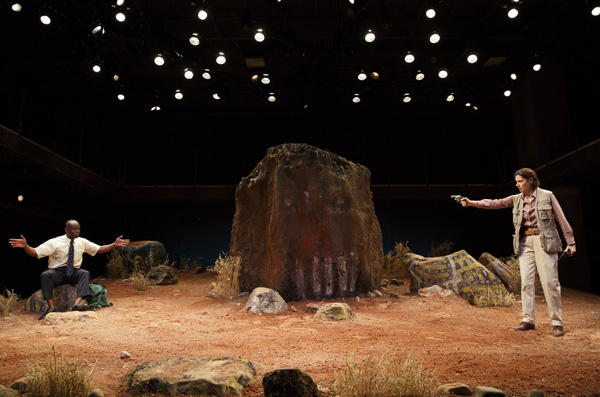The Painted Rocks at Revolver Creek

(© Joan Marcus)
No playwright has done more to publicize the injustices of apartheid South Africa than Athol Fugard. Plays like "Master Harold"…and the Boys and The Island received international acclaim while facing censorship in Fugard's home country. Since the end of apartheid, Fugard's plays have been more personal than political. His latest, The Painted Rocks at Revolver Creek (now making its world premiere at Signature Theatre), represents a return to politics, specifically a reckoning with lingering inequalities and the rule of law in modern South Africa. The result is as insightful as those earlier works, with an added layer of nuance that can only come from a seasoned dramatist like the 82-year-old Fugard.
The play is inspired by the rock garden created by artist Nukain Mabusa in Revolver Creek, a sleepy backwater in the eastern province of Mpumalanga. Between his duties as a farm laborer, Mabusa painted over a hundred rocks in colorful and complex patterns on land owned by his white employer. Sadly, much of the work is now lost to weather damage.
It's 1981 and Nukain (Leon Addison Brown) is contemplating his own mortality as he begins to paint his last and largest rock. Like a South African Bob Ross, he creates while telling his life story to his young helper (Caleb McLaughlin), whom everyone calls Bokkie (Afrikaans for "small buck"). Featuring a human figure walking the difficult roads of apartheid South Africa, this final painting is a huge departure from Nukain's previous work, which was mostly non-representative patterns or "flowers," as Nukain calls them. Elmarie (Bianca Amato), the wife of the farm's owner, notices this when she arrives bearing a plate of food for Nukain. She doesn't like this new direction.
"Why don't you wipe all that away…and make it a big flower, your biggest flower…to thank the Lord for all his blessings," she suggests. With a perfect Afrikaner accent, Amato conveys the insidious manner in which ostensibly nice white South Africans maintained the apartheid system. It's a soft oppression served with baked goods and a smile. "If you ask me, it's the parents who are to blame for what happened up there," she reflects upon the Soweto Uprising, an event that will presage the end of apartheid, opining, "If those fathers had taken off their belts and given those schoolchildren a good hiding, none of that would have happened." In this moment it's hard not to think of Toya Graham, the Baltimore mother who was widely lauded for physically disciplining her brick-wielding son in front of the TV cameras during the unrest in that city.
Amato gives an incredible performance, aging two decades for the second act in which a grownup Bokkie, who now goes by the name Jonathan Sejake (Sahr Ngaujah), returns to the farm to restore Nukain's rapidly vanishing final work. Costume designer Susan Hilferty outfits him in slacks, a white collared shirt, and a preppy tie (the uniform of the upwardly mobile, black middle class). Elmarie greets this well-dressed intruder with a gun, shaking with fear and rage as she points it at Jonathan's head. This bunkered Boer's fear comes from a real place: Seven of her white neighbors have been murdered in the past month and the new majority-black government doesn't seem to be doing anything to stop it.
Even under this tense circumstance, Ngaujah captures Jonathan's mix of pragmatism, idealism, and common decency. "Let us try again," he calmly says to the visibly shaken Elmarie after both have lost their tempers. "Try to understand each other. If we can't do that…then one thing is certain: Our future will be as big a mess as anything in our past." He seems to speak for the entire South African experiment, an admittedly imperfect republic whose respect for universal human rights stands in stark contrast to the vengeful kleptocracy of Robert Mugabe's Zimbabwe (which both Elmarie and Jonathan mention with derision).
Fugard (who also directs) has led the cast to remarkably layered performances. Brown heartbreakingly portrays a man gracefully surviving through decades of swallowed pride. With astoundingly real emotions, McLaughlin shows us a young man at the moment he truly begins to grasp the injustice of the world. In just four characters, they seem to embody all of South African society: where it has been and where it is going.
Scenic designer Christopher H. Barreca has created the arid landscape of Revolver Creek, covering the stage with red soil and dotting it with realistic-looking rocks, many of which are already fading in the African sun by the first act. Sound designer Stowe Nelson creates the ambient hum of the land, with birds chirping and church bells tolling in the distance. One can almost feel the sun radiating from Stephen Strawbridge's blazing lighting design.
The Painted Rocks at Revolver Creek is potent not just for its astute politics, but its subtly poignant meditation on mortality. As Nukain's flowers wilt from nature's endless assault, it becomes sharply clear that none of this will last forever. What takes its place very much depends on the patience and empathy of the current generation.











